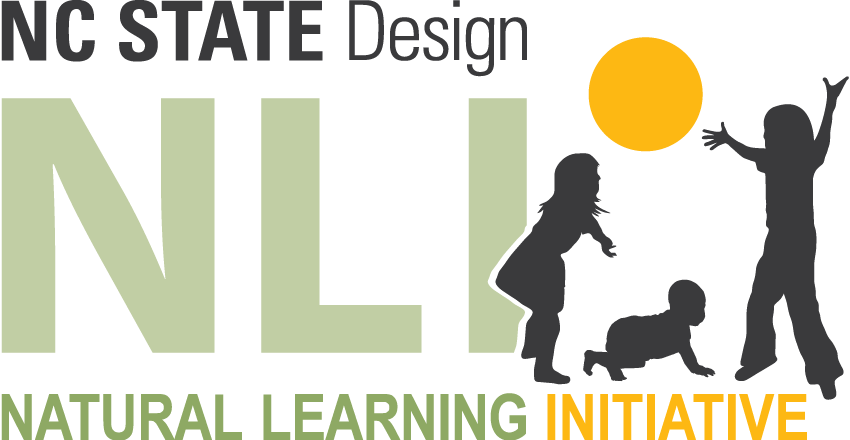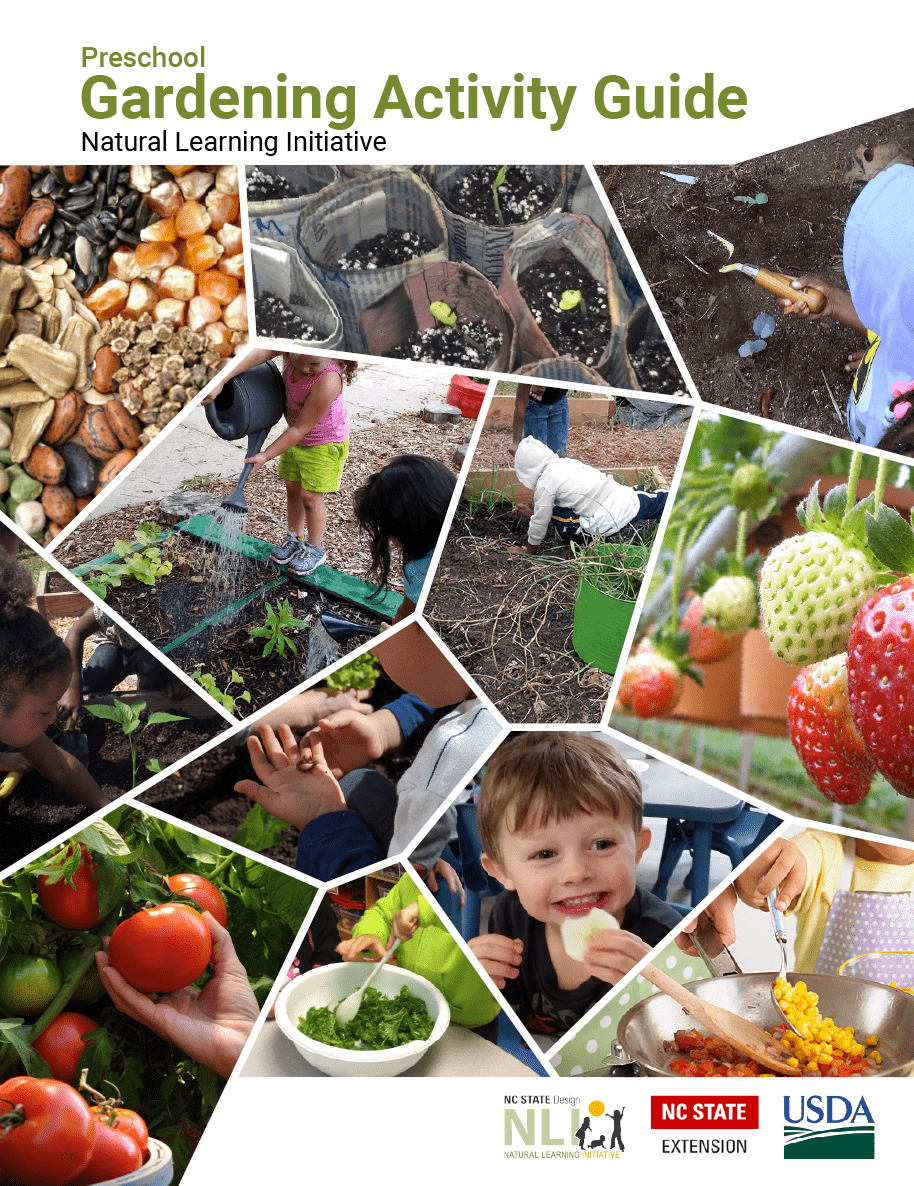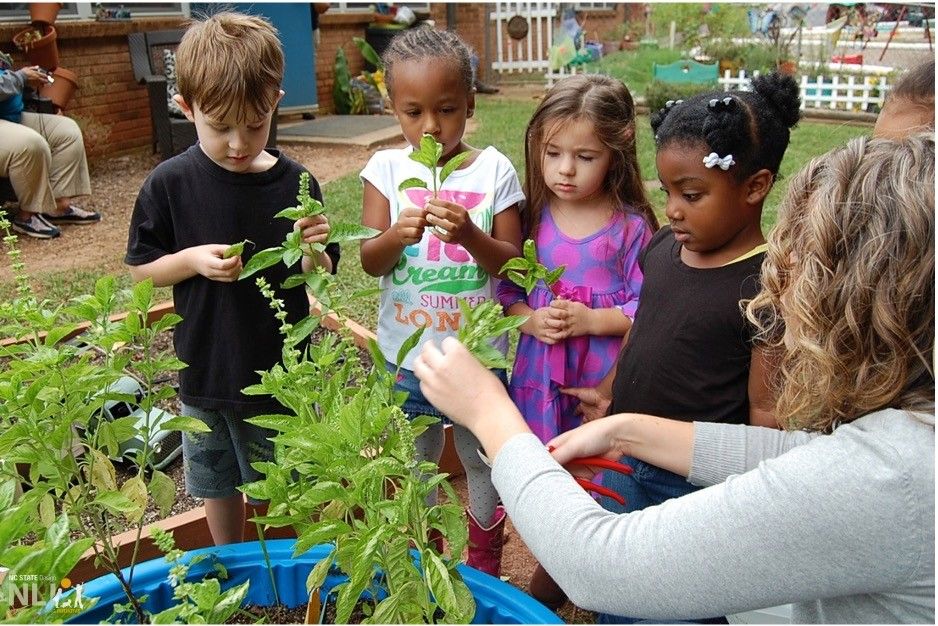For continuing education courses,
see NLI’s Gardening with Young Children (GWYC) online short course:
For academic research,
see COLEAFS (Childcare Outdoor Learning Environments as Active Food Systems) NLI-USDA grant research project:
Gardening with Young Children Resources
Hands-on gardening with young children tunes their taste buds to fresh fruit and vegetables and the enjoyment of healthy eating early in life. The sensory impact of gardening creates a positive understanding of how seeds turn into plants helped by soil, sun, water—and human care. Young children learn essential gardening skills for healthy living: planting, caring, harvesting, and ultimately preparing tasty eating experiences. Designated production gardens in childcare center outdoor learning environments can inspire lifelong healthy eating habits and provide replicable models for the families they serve.
NLI Gardening YouTube Shorts
This series of 3-min videos on YouTube illustrates children’s interactions with early childhood outdoor play and learning spaces (ECOPALS). Watch out for shorts that follow warm-season gardening, beginning with examining seeds and ending with preparing and eating the produce! The two initial series focus on physical activity and healthy eating and a third series will focus on social-emotional development. A fourth will include all kinds of other serendipitous, unpredictable outdoor happenings. Please stay tuned!
(Eating and Learning with Apples Video) NC Crunch this Fall celebrated NC Farm to School and Early Care and Education Month by hosting events at more than a dozen Wake County Childcare including Bambino’s Playschool and A Safe Place Child Enrichment Center, with programs that support healthy eating habits. NC Crunch recognizes how healthy eating contributes to child and family well-being, while also promoting North Carolina agriculture by crunching into locally grown fruits and vegetables!
Bambino’s Playschool, a current POD site, is committed to making a shift in the way children and their families view healthy eating. The owner/director, Adria Boyd, takes great pride in only serving children fresh produce. The school’s chef, affectionately known as Mama Jenkins, makes eating healthy meals fun and inviting for children. Her passion for healthy eating is inspiring. Bambino’s is licensed for 164 children birth-K.
For many years POD site a Safe Place has served as an inspiring, collaborative NLI research and professional development resource production site, including several YouTube Gardening With Young Children video “shorts.”
Preschool Gardening Activity Guide
The Preschool Gardening Activity Guide, companion to the Childcare Center Production Garden Series, is based on the NLI Preventing Obesity by Design (POD) program. The aim is to elevate children’s knowledge and enthusiasm for eating fresh fruit and vegetables.
The guide introduces garden educators and volunteers to a 12-step, hands-on learning process with young children to engage them in seasonal fruit and vegetable gardening. Each step includes suggestions for related children’s literature. Prior gardening experience is not assumed. The underlying goal is to counteract the early onset of health challenges associated with sedentary lifestyles, poor eating habits, and lack of contact with nature. To download the guide, please use the form below.
LOCAL FOODS: Childcare Center Fruit & Vegetable Gardening Series
The Childcare Center Production Garden Series is a joint production of NLI, NC Cooperative Extension, and the Center for Environmental Farming Systems (CEFS). This project was supported by the John Rex Endowment. Download pdfs below.
Created for early childhood educators, the series is an outcome of NLI’s many years of experience with childcare garden design, installation, and professional development, via centers participating in the NLI Preventing Obesity by Design (POD) program. Topics include creating garden infrastructure, growing and preparing fruits and vegetables in warm and cool seasons, and composting techniques.
1. Growing and Cooking Fruits and Vegetables at Childcare Centers
This publication summarizes the benefits of fruit and vegetable gardening with children. It includes age-appropriate activities for childcare providers to engage young children in using fresh produce from a production garden for cooking and eating. This is the first of eight publications about childcare center production gardens.
Mitchell, C., Moore, R., Cosco, N. (2015). Growing and Cooking Fruits and Vegetables at Childcare Centers. LF-007-01. Raleigh: NC State Extension.
2. Creating Childcare Center Production Gardens
This publication focuses on developing fruit and vegetable production gardens in the Outdoor Learning Environment (OLE) of childcare centers. Included are basic garden design and layout to help childcare centers get started in year-round gardening activities. This is the second of eight publications about childcare center production gardens.
Moore, R., Cosco, N., Konradi, S., Archer, M. (2015). Creating Childcare Center Production Gardens. LF-007-02. Raleigh: NC State Extension.
3. Growing Warm-Season Fruits and Vegetables in Childcare Production Gardens
This publication focuses on easy-to-grow, child-friendly, warm-season fruits and vegetables suitable for childcare center gardening. This is the third of eight publications about childcare center production gardens.
Archer, M., Konradi, S., Lelekacs, J., Driscoll, E. (2015). Growing Warm- Season Fruits and Vegetables in Childcare Production Gardens. LF-007-03. Raleigh: NC State Extension.
4. Growing Cool-Season Vegetables in Childcare Production Gardens
This publication focuses on easy-to-grow, child-friendly, cool-season vegetables suitable for childcare center gardening. This is the fourth of eight publications about childcare center production gardens.
Archer, M., Konradi, S., Lelekacs, J., Driscoll, E. (2015). Growing Cool-Season Vegetables in Childcare Production Gardens. LF-007-04. Raleigh: NC State Extension.
5. Snacking and Cooking with Warm-Season Produce from Childcare Production Gardens
This publication includes simple recipes that childcare center cooks and educators can use to engage children in snacking and cooking with fresh warm-season fruits and vegetables from on-site production gardens and elsewhere. This is the fifth of eight publications about childcare center production gardens.
Mitchell, C. (2015). Snacking and Cooking With Warm-Season Produce. LF-007-05. Raleigh: NC State Extension.
6. Snacking and Cooking with Cool-Season Produce from Childcare Production Gardens
This publication includes simple recipes that childcare center cooks and educators can use to engage children in snacking and cooking with fresh cool-season vegetables from on-site production gardens and elsewhere. This is the sixth of eight publications about childcare center production gardens.
7. Composting in Childcare Production Gardens
This publication is a how-to guide for starting a garden-related standard compost bin in a childcare center Outdoor Learning Environment (OLE). Included is guidance on design, construction, and management of compost bins as well as curriculum connections. This is the seventh of eight publications about childcare center production gardens.
8. Vermicomposting in Childcare Production Gardens
This publication is a how-to guide for starting a garden-related vermicomposting bin in a childcare center Outdoor Learning Environment (OLE) or indoors. Included is guidance on design, construction, and management of vermicomposting bins as well as curriculum connections. This is the eighth of eight publications about childcare center production gardens.


